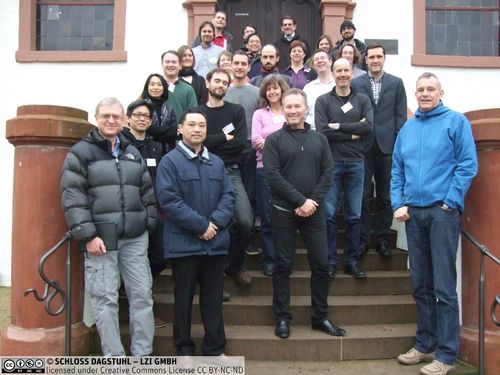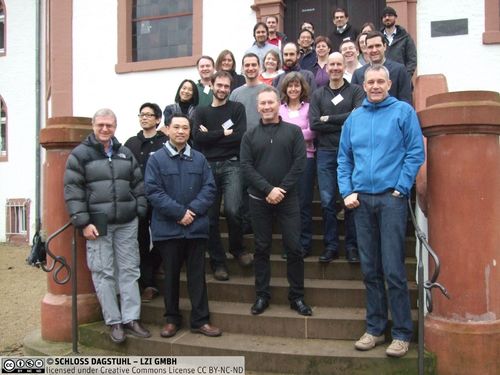Dagstuhl-Seminar 13512
Social Issues in Computational Transportation Science
( 15. Dec – 19. Dec, 2013 )
Permalink
Organisatoren
- Glenn Geers (Data61 / NICTA - Sydney, AU)
- Monika Sester (Leibniz Universität Hannover, DE)
- Stephan Winter (The University of Melbourne, AU)
- Ouri E. Wolfson (University of Illinois - Chicago, US)
Kontakt
- Annette Beyer (für administrative Fragen)
Programm
This seminar brings together researchers working in areas contributing to Computational Transportation Science (CTS). CTS is an emerging discipline that combines computer science and engineering with the modeling, planning, social, and economic aspects of transportation. The discipline studies how to improve the safety, mobility, and sustainability of transportation systems by taking advantage of information technologies and ubiquitous computing. In this seminar we focus on the social computing aspect of CTS. Focusing on social computing was influenced by the many recent developments in social networks and crowd-sourcing for transportation as well as the integration of persuasive technologies, behavioral economics in social computing. The researchers and practitioners will review the developments in this direction, discuss issues and solutions, and plan joint publications on CTS from the social computing perspective.
The following topics will be discussed at the seminar:
Managing Competition and Collaboration among Travelers.
Travelers in a traffic network often need to make decisions about activities such as routing and parking. With the advent of location based services, wireless communication devices, and car navigation systems with real-time traffic, travelers now have the information to help them make these decisions. However, the models and tools needed to take advantage of this information are lacking. For example, the route guidance methods that are used by car navigation systems are based on choosing a shortest path. But the shortest path could be sub-optimal if a large number of vehicles choose the same path, leading to a “herding” effect. This in turn will backfire, i.e. lead to a longer travel, because as the number of vehicles on a route increases, so will the travel time on the route. Similarly, a bus, a train, or an available parking slot that seem attractive to a traveler may become much less desirable if many travelers make the same choice. In other words, the pervasiveness of real-time travel information renders the existing tools inadequate, and the decision-making unsupported.
Crowd-sourcing.
In a crowd-sourcing system, services are provided by the users themselves rather than by a business or organization. The transportation information that may be crowd-sourced includes real-time traffic information of
road segments, information about car accidents and available parking slots, ride sharing opportunities, and so on. Crowd-sourcing may be implemented using either the client/server model, or the peer-to-peer model, or a combination of the two. In the transportation environment, peers can be highly mobile and the peer-to-peer communication is subjected to disconnections when a short-range wireless technology is used. In this case, the peer-to-peer crowd-sourcing introduces special challenges to incentive mechanisms. Many issues remain to be solved, among them transactional/atomicity issues in pricing schemes, reputation management in non-pricing schemes, game theoretic schemes, privacy issues, and exploiting social networks like Twitter of Facebook, where it is assumed that friends share trustworthy information.
Behavioral Economics and Persuasive Technologies.
Behavioral economics uses social, cognitive and emotional factors in understanding the economic decisions of individuals and institutions performing economic functions. Behavioral economics has made inroads in transportation in the areas of survey design, prospect theory, and attitudinal variables. Further infusion into transportation will lead to significant benefits in terms of increased ability to both predict and influence behavior. Computational transportation science can contribute to more sustainable transport by transferring findings in behavioral economics to transportation, with a focus on personalized information and social influences to change behavior.
The Dagstuhl Seminar "Social Issues in Computational Transportation Science" (13512) brought together researchers working in various areas contributing to Computational Transportation Science (CTS). CTS is an emerging discipline that combines computer science and engineering with the modeling, planning, social, and economic aspects of transportation. It is the discipline behind intelligent transportation systems (ITS), i.e., emerging from the convergence of ICT and transportation. The discipline studies how to improve the safety, mobility, and sustainability of transportation systems by taking advantage of information technologies and ubiquitous computing.
After a first Dagstuhl Seminar on CTS in 2010 (10121), in this seminar we focused on the social computing aspect of CTS, reflecting on the potential of many recent developments in transportation, such as social networks, crowdsourcing of spatial data, persuasive technologies, and behavioural economics in social computing.
In fact, the seminar (which was a day shorter because of Christmas) consisted of three parts: a number of tutorials and short talks, a competition for the best application challenge in CTS, and a joint sketch of an introductory course on CTS. An excursion to the Christmas Market in Trier rounded up the week.
The CTS application challenge was inspired by above mentioned social aspects, such as incentives to change travel behaviour, data integration / analytics required to feed these incentives, multimodal integrated door-to-door travel, autonomous vehicles, automated crowdsourcing for travel statistics, or smart solutions for the parking problem. In case you are curious which team won the best proposal award, their proposal is online.
The sketch of an introductory course on CTS clearly profited from the broad variety of expertise at the seminar. Everybody was learning from the sketches of modules contributed by others, to a degree that we all wished we could take this course in full length.
Overall, this report collects material that wants to be taken into practice. We hope that we inspire teams all over the world to contribute ICT expertise for more sustainable mobility choices, and perhaps add to the development of curricula in this area.
 Glenn Geers, Monika Sester, Stephan Winter, and Ouri E. Wolfson
Glenn Geers, Monika Sester, Stephan Winter, and Ouri E. Wolfson
- Francesco Ciari (ETH Zürich, CH) [dblp]
- Caitlin Doyle Cottrill (University of Aberdeen, GB) [dblp]
- Sergio Di Martino (Volkswagen AG - Wolfsburg, DE) [dblp]
- Jan Fabian Ehmke (FU Berlin, DE) [dblp]
- Rob Fitzpatrick (NICTA - Eveleigh, AU)
- Stefan Funke (Universität Stuttgart, DE) [dblp]
- Glenn Geers (Data61 / NICTA - Sydney, AU) [dblp]
- Sergio Ilarri (University of Zaragoza, ES) [dblp]
- Benjamin Kickhöfer (TU Berlin, DE) [dblp]
- Franziska Klügl (University of Örebro, SE) [dblp]
- Alexandros Labrinidis (University of Pittsburgh, US) [dblp]
- Patrick Laube (ZHAW - Wädenswil, CH) [dblp]
- Steve Liang (University of Calgary, CA) [dblp]
- Thomas Liebig (TU Dortmund, DE) [dblp]
- Seng Wai Loke (Latrobe Univ. - Bundoora, AU) [dblp]
- Dirk Christian Mattfeld (TU Braunschweig, DE) [dblp]
- Harvey J. Miller (University of Utah, US) [dblp]
- Walied Othman (Universität Zürich, CH) [dblp]
- Nicole Ronald (The University of Melbourne, AU) [dblp]
- Peter Sanders (KIT - Karlsruher Institut für Technologie, DE) [dblp]
- Monika Sester (Leibniz Universität Hannover, DE) [dblp]
- Sabine Storandt (Universität Freiburg, DE) [dblp]
- Sabine Timpf (Universität Augsburg, DE) [dblp]
- Stephan Winter (The University of Melbourne, AU) [dblp]
- Ouri E. Wolfson (University of Illinois - Chicago, US) [dblp]
- Bo Xu (Argonne National Laboratory, US) [dblp]
- Yang Yue (Shenzhen University - Guangdong, CN) [dblp]
Verwandte Seminare
- Dagstuhl-Seminar 10121: Computational Transportation Science (2010-03-21 - 2010-03-26) (Details)
- Dagstuhl-Seminar 16091: Computational Challenges in Cooperative Intelligent Urban Transport (2016-02-28 - 2016-03-04) (Details)
- Dagstuhl-Seminar 22162: Urban Mobility Analytics (2022-04-18 - 2022-04-22) (Details)
Klassifikation
- mobile computing
- optimization / scheduling
- society / human-computer interaction
Schlagworte
- Computational transportation science
- intelligent transportation systems
- social computing



 Creative Commons BY 3.0 Unported license
Creative Commons BY 3.0 Unported license
